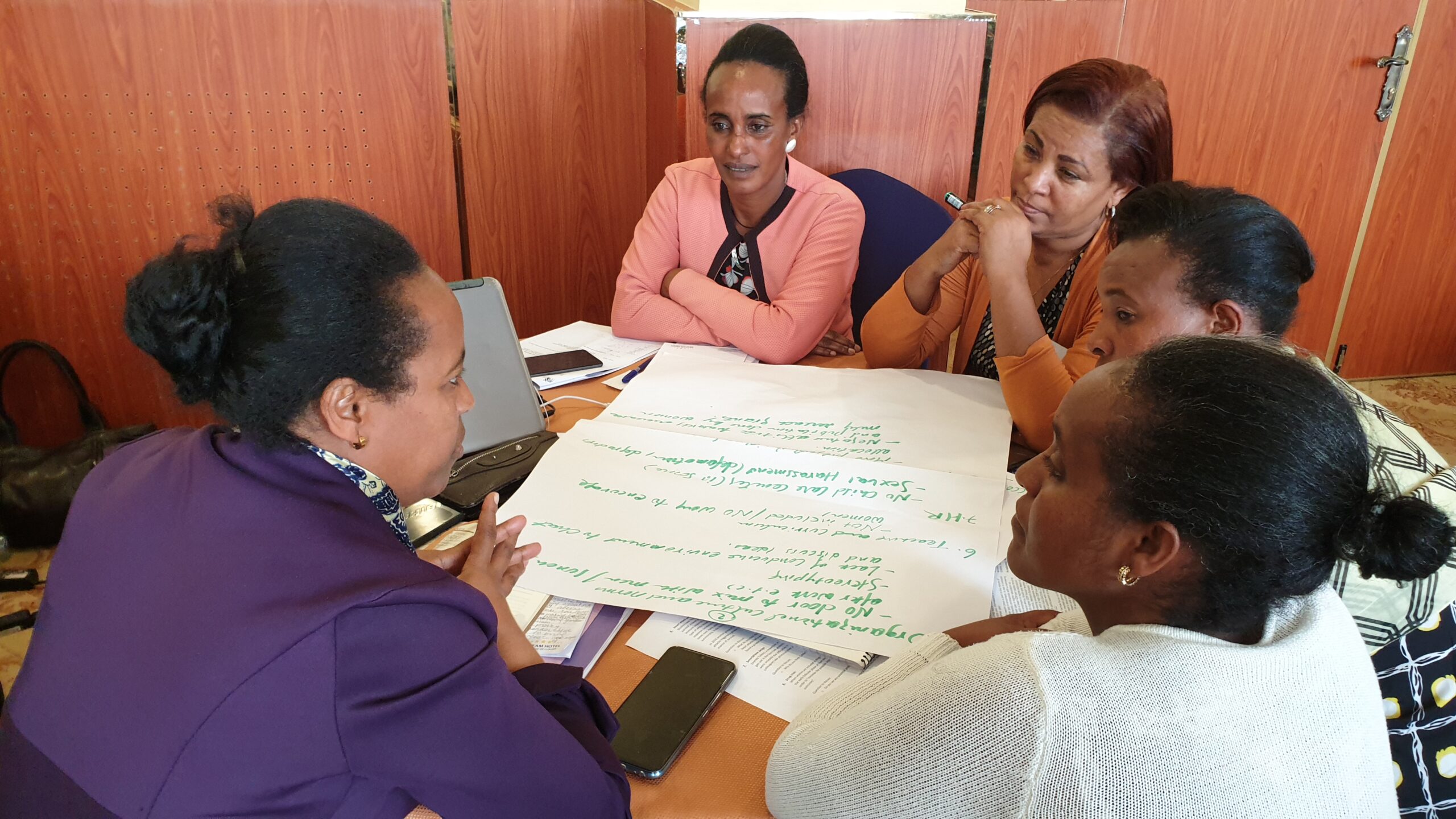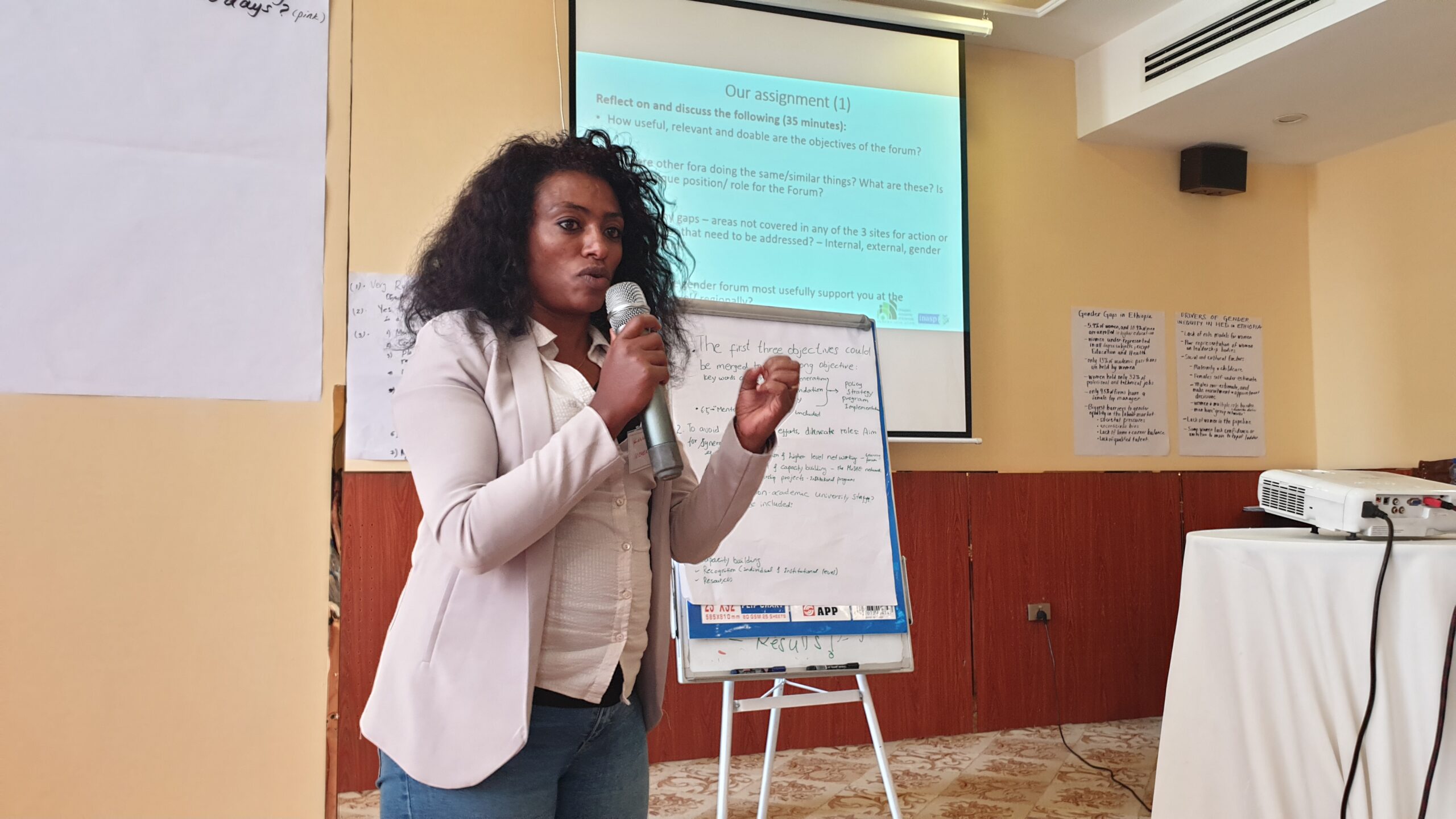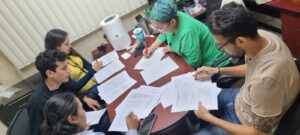Addressing gender issues in Ethiopian higher education and research institutions – stories from Ethiopian gender champions (part one)
With the mission to promote gender equity in Ethiopia’s higher education and research institutions, the Ethiopian Academy of Sciences and INASP launched the Ethiopian Gender Learning Forum in February 2020. The establishment of this forum is part of the Global Platforms for Equitable Knowledge Ecosystems (GPEKE) programme (funded by Sida).
This forum brings together representatives (called gender champions) from 29 higher education and research institutions from across Ethiopia to discuss and reflect on gender-related issues in the country related to their work and research, and to find solutions to the problems they identify.
According to the 2021 Global Gender Gap Report published by the World Economic Forum, only 5.3% of women are enrolled in higher education in Ethiopia compared with 10.9% of men (1). The gender gap becomes even larger when looking at leadership, where in 2019-2020 women held only 10.6% of executive management positions across the 45 public universities in Ethiopia, and made up less than 5% of deans and 3% of department heads (2).
We talked to some of the many gender champions of the Ethiopian Gender Learning Forum to tell us about the gender issues and gaps they see in Ethiopia and how they hope the forum can help address these. As we have many stories to share, this blog is the first of two parts. Read part two here.
Yalemtsehay Mekonnen, Professor in Biological Sciences, Addis Ababa University
“I was the only woman graduating from my graduate programme, some 30-plus years ago. In higher education, although the number of girls enrolling is increasing – and there is an increase in female instructors and female academicians – most of them are young. I want them to get all the proper encouragement to undertake research and be involved in teaching, and also deliver as much as they can. When this happens then the system becomes responsive to whatever they’re doing.
Because of this, I have that passion to motivate young girls, women, and also, of course, the boys as well. This is why I’m interested in being involved in issues that address the disparity, the disproportionate contribution or resource-sharing, at all levels.
In the last few years there has been a very good intention, at least, to help women or girls through affirmative action in the universities. Enrolment in higher education has increased, although the quality is a question mark, so I can see a light at the end of the tunnel. But there is a lot to be done to put the policies in place, and to have a targeted action plan for the short-term, medium-term and long-term, because, as the saying goes, “you cannot build anything overnight.
I’m optimistic about some of the initiatives that are being taken, such as the work with INASP and the Ethiopian Academy of Sciences. We can make a difference if we come together and then contribute our share, individually as well as institutionally.
The Ethiopia Gender Forum is really good because the mix is good; young, middle and also experienced scholars or academicians, researchers. The exchange is good – there could be fresh and new ideas and there is an opportunity for experience-sharing and role-modelling. Because I’m senior I can share my experiences and it’s also good for me to see the motivation and the vision that the younger scholars or female academicians have that come from different parts of the universities of Ethiopia and research institutes.”
Haregewoin Fantahun, Senior Advisor to the Minister of Science and Higher Education
“The gender disparity in Ethiopian higher education institutions is very large. We have very few female academicians, and those we do have are not engaged in research, community activities, even in teaching and learning activities – for a number of reasons. They need empowerment, they need support, they need someone to help them to get academic promotions, to release publications, and to get them into leadership positions. In all these cases, capacity-building is a very, very determining factor for them.
I think the biggest challenge these days is the lack of women-friendly environments within higher education institutions. The working environment, the social environment, the networking – all these are not supporting for women to use their potential, to use their time effectively, and to be engaged in different activities. So that is really the first, and the major, challenge that most female academics confront.
There are so many benefits to a forum like this! The main one is that we share our experiences, and we support each other in various ways. We share materials, we share information, and we support each other on how to better ourselves. Another benefit is that we female academics can coach each other, and we learn together. We share – not only the challenges – but the lessons learned; our best experiences. It is hugely energising to take part.
I think that the government, as well as non-government organisations working in this area, should go further to create opportunities, to strengthen networking, to bring female academics together, to provide appropriate forums for this, because it’s really difficult for female academics from different universities to come together. There are budget implications, work implications, and so on, so we need support in facilitating, organising and creating forums like this where we can come together.”
Kahsa Tadel Gebre, Instructor and Director of the Institute of Environment, Gender and Development Studies, Mekelle University
“A lot has been done, but the gender gap still exists. This is due to multiple reasons. The first thing is the multitude of roles for women – we are mothers, we have a family, we have a career, and we are leaders. So you can see the burden.
And, of course, when you are in leadership, there is a competition between your career and your leadership; when you are in leadership you don’t really have time for your career – you don’t have time to write, you don’t have time to publish, and so on, because what you do is you lead – and, of course, you lead your family as well. So you lag behind.
To help address this, we have housing facilities on the campus; we also have a day care centre. This helps a little bit, but still I believe that the gaps exist because of the multiple roles of women.
I used to live downtown. I would go by bus, from home to work, then from work to home, going home for lunch, then back again, and so on. At that time I had a baby, so the only job that I was doing was teaching, because I was busy in the house and with the baby that I had no time for anything else. I had reports from several projects to send, but I never had time to draft the manuscripts. Then there was a vacancy for housing and Mekelle University established a separate quota for female academicians. This was necessary because, if you look at the criteria for the housing, the first criterion is academic position. You might see a few females of a high academic rank, for example assistant professor and above, but the majority of them are at the master’s or lecturer level. The second criterion is leadership position – and, of course, no females are involved in leadership, so by default there will be zero eligible women. So when all these criteria are added together, the women had no chance of getting a house. To address this, the university made 20% of the houses specifically available to women.
I was the beneficiary of the 20% quota, and I moved into the house on the campus. This gave me much more time; I could go home and take care of my family, and then I could work late until 8 in the evening and go back to the office after the kids were asleep. I started to draft my report manuscripts, then I started to submit them to different journals, and within a year I had applied for a promotion to the higher ranks. Now I am associate professor. And I’m not the only beneficiary – so many women benefited from this approach. I think it is very, very important, and other universities should think seriously about adopting this scheme.
At places like this forum, you share ideas, you share practices, you share burdens as well. And when you talk, when you share your burdens, you get solutions. It’s really, very important that we come together, that we exchange ideas. We plan for the future, plan what we can do together. We support each other. This forum brings all these ideas, all these resources, together, and for a strong impact.
We know that females have a large burden. It’s true, we know that. And we are living it. But we shouldn’t give up. We have to fight, we have to work hard; and the decision makers, the officials, they have to realise that they must create an enabling environment for women. Because having a family is not a mistake, not a problem. We are contributing to the world, to society. If we women stopped giving birth, then imagine what would happen. So yes, we need to have a family, but what we also need is an enabling environment, so we can progress in our academic area, so we can access the high leadership positions.”
Tsige Gebre-Mariam, Professor of Pharmaceutical Technology at Addis Ababa University and President of the Ethiopian Academy of Sciences
“Gender equity, wherever you may be, but particularly in developing countries, is crucial because we have an enormous gap in all spheres of endeavours, from household-, to community-, to national level. And the most crucial thing is equity in education. We are lagging behind, particularly in higher education and research; our women are lacking. This has been a talking point, a national issue in Ethiopia. To my knowledge, no integrated action has been taken so far, although the government is trying to address gender equity in all areas – in education, in parliament, in government, and in sector ministries.
But what this forum has been doing, is to address gender equity in a holistic, integrated, and participatory manner. The benefit of dealing with the issue in this way is to bring about a strategic approach to tackling equity problems; because the inequity could be social, it could be political, it could be religious, cultural, you name it. So when you approach it holistically, you can list out the various gaps and address them in an integrated manner.
We are trying to address it, because we have an enormous backlog. We can’t address it in a short period of time, but if we design a strategic plan with actions to be taken in the short-, medium- and long-term, we’ll get there. It is a talking point, a topical issue – a national issue at the moment. We are talking about gender equity everywhere. In the ministry, in our parliament, in cabinet – everywhere the question of equity is being addressed.
The Ethiopian Academy of Sciences is playing a really important role in addressing gender equity. We have public lectures on gender issues, and we have small projects addressing, for example, the quality of education in relation to gender equity. And we can also play a critical role in the future, together with all stakeholders, in creating a platform for dialogue, for discussion, for addressing the issues in a holistic manner, and bringing together all the key players to discuss the issue, to draft a strategic plan and also to monitor and evaluate our plans, so that these issues are addressed in a timely manner.”
Read part two of this blog mini-series here.
(1) 1 World Economic Forum, (2021). Global Gender Gap Report 2021.



 Previous Post
Previous Post


